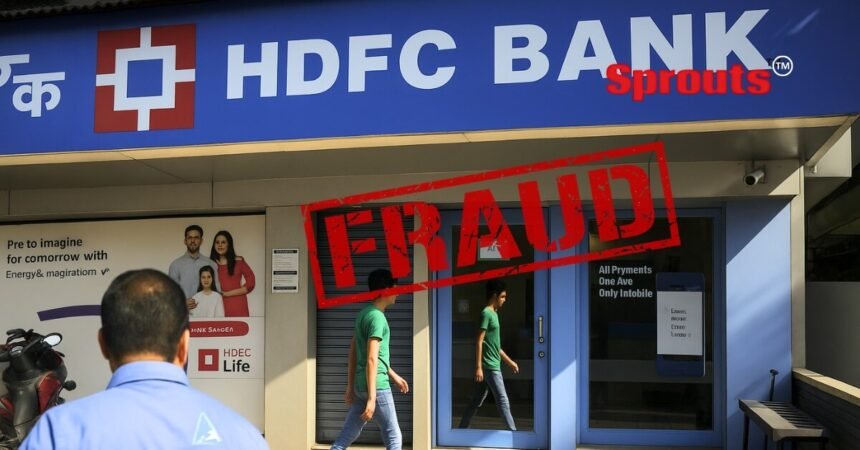HDFC Bank Faces Fraud Allegations by NRIs
• HDFC in Hot Water: AT-1 Bond Fraud Alleged
• NRIs Cry Fraud, HDFC Faces Probe
• Trust Broken: HDFC’s AT-1 Bond Controversy
Unmesh Gujarathi
Sprouts News Exclusive
Contact: +91 9322755098
HDFC Bank faces serious allegations from NRI clients who claim ₹25–30 crore of their fixed deposits were misused to purchase high-risk AT-1 bonds via the bank’s Middle East branches. Complaints filed with the EOW cite forged income details and lack of disclosures. FIR likely; SIT and regulators are investigating.
NRIs Allege Fraudulent Diversion of Fixed Deposits by HDFC Bank
India’s leading private sector lender, HDFC Bank, is now under a cloud of serious financial misconduct allegations involving its Middle East operations. At least four Non-Resident Indian (NRI) clients have filed complaints with the Economic Offences Wing (EOW) in Nagpur, Chandigarh, and Gurgaon, accusing senior bank officials of fraudulently diverting fixed deposit funds worth ₹25–30 crore into Additional Tier-1 (AT-1) bonds. The matter was first flagged by Sprouts News Investigation Team (SIT) after gaining access to key documents and client testimonies.
According to an NDTV Profit report corroborated by SIT sources, the alleged fraud dates back to 2021, when AT-1 bonds issued by Credit Suisse were purchased using funds from unsuspecting clients. These complex debt instruments, typically reserved for High Net-Worth Individuals (HNIs), were sold to retail NRI investors without their full knowledge or informed consent.
Click Here To Download the News Attachment
Income Details Allegedly Fabricated to Push AT-1 Bond Sales
One of the most serious claims involves the forging or exaggeration of income details to falsely qualify NRI clients for investment in these high-risk bonds. In a documented instance, a customer’s annual income was allegedly inflated from $40,000 to $140,000. Such misrepresentation enabled the sale of instruments that these individuals would otherwise be ineligible for.
Moreover, the clients were reportedly promised returns of 12–13%, with no adequate disclosure of the high risk associated with AT-1 bonds—especially after the Credit Suisse-UBS merger, which resulted in a complete write-off of these bonds in 2023. These clients were not even provided full Master Service Agreements, thereby raising questions about informed consent and fiduciary responsibility.
The Sprouts News Investigation Team has learned that loans were extended against the AT-1 bonds, and when the bonds were rendered worthless, the loans were arbitrarily adjusted against the clients’ fixed deposits, resulting in massive personal financial loss.
Jurisdictional Challenges and Regulatory Inaction
Complicating the matter is the fact that these bond purchases were facilitated through HDFC Bank’s Middle East branches, where different regulatory frameworks apply. This cross-border transaction structure is now being scrutinized by both Indian and Middle Eastern regulatory authorities. According to Sprouts News financial regulators in the Gulf region have also launched independent investigations, especially into whether due diligence norms and KYC rules were bypassed.
Also Read: Ex‑SEBI Chief GN Bajpai Faces ₹975 Cr GB Global Scam Show‑Cause.
Despite repeated attempts by the affected clients to seek redressal since 2023, there has been no concrete resolution from HDFC Bank. The aggrieved investors allege that the bank has stonewalled communications and evaded accountability, thereby forcing them to escalate the matter to enforcement agencies.
FIR Likely Soon; SIT Calls for Immediate Intervention
An FIR is likely to be registered next week, according to sources within the Economic Offences Wing. The Sprouts News Investigation Team (SIT) has urged authorities to probe the matter with urgency, citing potential violations of FEMA, RBI’s fair practice code, and possible criminal breach of trust.
Given the size of the alleged fraud and the bank’s stature, industry stakeholders, NRIs, and policymakers alike are watching this case closely. The outcome may have far-reaching implications on NRI banking trust, cross-border investment protocols, and compliance systems within private sector banks.




